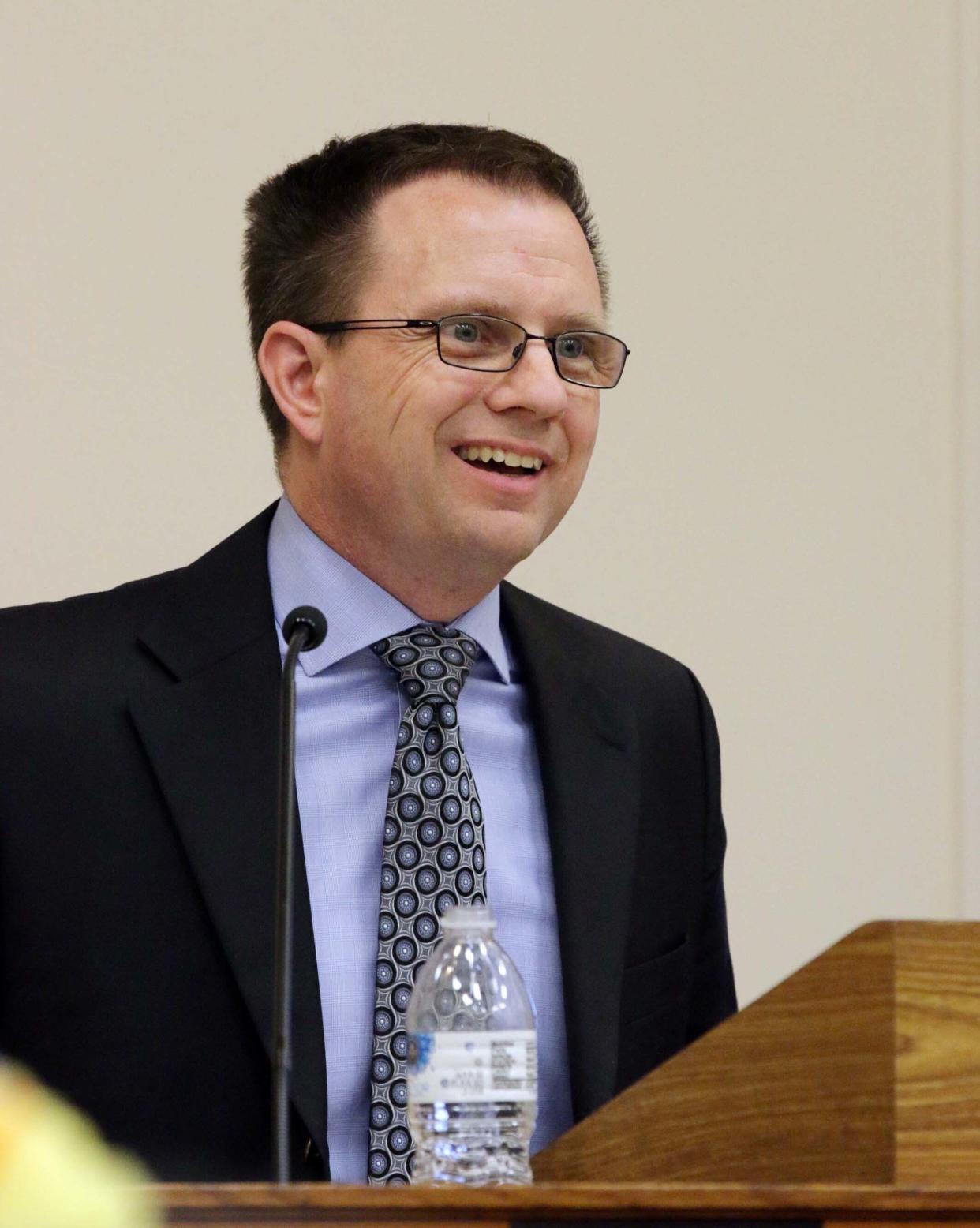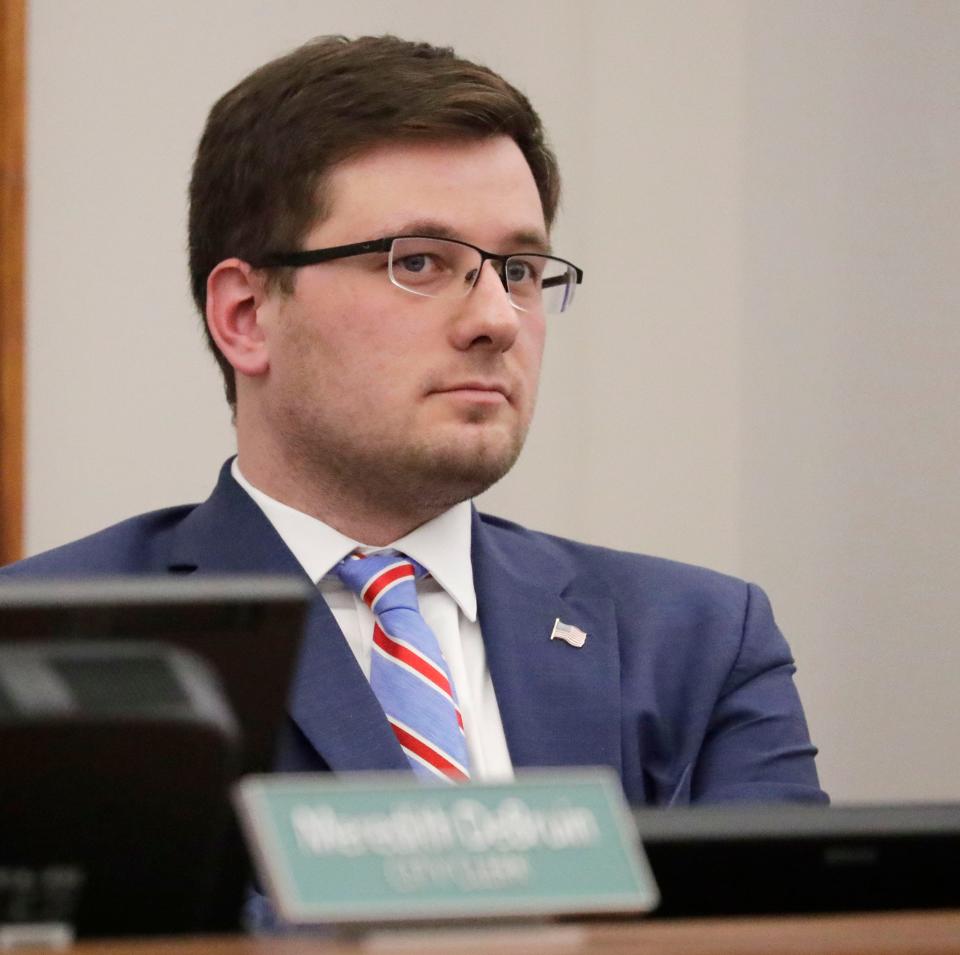Where former Sheboygan City Administrator Todd Wolf's lawsuit stands after judge’s order on motion to dismiss

SHEBOYGAN — An order by a district court judge dismisses four of 10 claims alleged by fired Sheboygan City Administrator Todd Wolf’s lawsuit against about a dozen Sheboygan defendants.
On Feb. 6, Wolf filed a 63-page complaint in the U.S. District Court for the Eastern District of Wisconsin suing the City of Sheboygan and Mayor Ryan Sorenson, among others. Two months later, he filed an amended complaint of 68 pages with 40 additional pages of exhibits.
In the Sept. 5 Order on Motion to Dismiss, U.S. Magistrate Judge William Duffin called the amended complaint “expansive” and potentially counterproductive in its length, possibly resulting in a court overlooking crucial details.
“It is dense and at times argumentative, with many tangents, hyperbolic assertions, and sarcastic scare quotes,” Duffin said. “For a plaintiff, this approach to pleading saves him the trouble of having to identify and focus on the details that really matter. But when a plaintiff throws everything into a complaint, it creates unnecessary costs for the defendants and requires the court to devote a disproportionate amount of its scarce resources to one case.”
Duffin goes on to say that while some judges would “demand a re-do,” he will get on with the case, saying, “Although pleading by screed is a poor practice, courts are ill-equipped to correct all of a lawyer’s bad habits.”
Wolf dismissed former Sheboygan Press reporter Maya Hilty as a defendant and the remaining 13 defendants moved to dismiss Wolf’s complaint. The September decision by Duffin breaks down Wolf’s allegations and claims in order to rule of the motions for dismissal.
Wolf’s attorney Jennifer DeMaster declined to comment on this story on behalf of herself and Wolf.
Background on the case
On Jan. 9, Todd Wolf was fired from his role as city administrator following an investigation by outside attorney Jill Hall. The investigation report concluded Wolf engaged in conduct that could be considered a violation of city policies.
In an 8-2 vote, Sheboygan City Council fired Wolf without cause.
Prior to his firing, Wolf worked as city administrator for about two-and-a-half years before being placed on administrative leave in November 2022. The paid leave allowed for Hall’s investigation into “allegations and concerns regarding (Wolf’s) conduct,” City Council President Barb Felde told Sheboygan Press in November.
Wolf’s allegations in the district court case follow events dating to March 2021 through his firing and the public release of Hall’s investigation.

Claim one
In Wolf’s first claim, as broken down by Duffin, he alleges the leave directives given to him were unconstitutionally overbroad.
According to the order, when Wolf was placed on leave, the city of Sheboygan said he was not authorized to speak — by any means of communication — with any city employees or individuals conducting city business or to the media about city matters.
He was additionally informed failure to follow these restrictions would be deemed insubordination and may subject him to discipline.
In Wolf’s amended complaint, he said those directives violated his First Amendment rights.
According to the order, the defendants argued the directives were clear in their meaning, but the city failed to sustain their burden of showing that restricting Wolf’s protected speech outweighed the city’s interest in the restrictions.
While Duffin dismissed Wolf’s overbreadth challenge of the leave directives, the defendants’ motion to otherwise dismiss claim one was denied.
Claim two
Claim two alleges Sheboygan’s confidential information policy is unconstitutionally overbroad.
The policy states no city officer, employee or agent can disclose confidential information concerning property, government or affairs of the city without proper legal authorization. Additionally, none of those individuals can use such information to advance their financial or other private interests.
Wolf claims the policy violates his First Amendment rights and named the city of Sheboygan and Charles Adams, city attorney, defendants in the claim, the order said.
Duffin concluded Wolf lacked standing in his claim and granted the defendants’ motion for dismissal.
Claim two was dismissed in full.
Claim three
Like claim two, claims three and four center a Sheboygan municipal code.
Wolf’s third claim alleges Sheboygan’s False Statements, Reports ordinance is overbroad. The order reports Wolf named the city of Sheboygan as the defendant in this claim.
The ordinance states, “No persons shall make any false statement or report with regard to any test, certification or appointment made under any provisions of this chapter or in any manner commit or attempt to commit any fraud preventing the impartial execution of this chapter and policies.”
Wolf alleges the ordinance, and its enforcement mechanisms, are “unconstitutional because they impose fines and potential jail time on past employees and private citizens who make any statements about public corruption” the government deems false, according to the order.
When referring to the section of Wolf’s claim that the ordinance is unconstitutional because it allows for punishment for First Amendment protected acts, Duffin said, “His argument again appears to be based on a misunderstanding of the scope of the ordinance.”
This ordinance is only talking about a specific type of false statement, he said.
Even though Wolf’s argument appeared to have flaws, so did the city’s answer. The city depended on the “incorrect premise” that the ordinance is content neutral, Duffin said, which he said it is not.
Therefore, the judge found the city failed to demonstrate dismissal of the claim was appropriate.
Wolf’s third claim was permitted to proceed.
New city directors: Sheboygan Common Council approves new city administrator, planning and development director
Claim four
Wolf also claimed the false statements ordinance was unconstitutionally vague, the order said. In this claim, Wolf named the City of Sheboygan defendant.
Wolf claimed because it’s too vague, it violates his 14th Amendment right to due process. The Due Process Clause states “no State shall … deprive any person of life, liberty, or property, without due process of law.”
Wolf claimed the ordinance required employees to guess whether a statement would be labeled as false and if the statement would result on discipline, according to the order. Duffin said Wolf’s claim is based on a “mistaken understanding” that an employee would face discipline based on a “subjective assessment of the truth.”
“But there is nothing vague about a prohibition against a false statement,” Duffin said. “A person of ordinary intelligence — in fact, a young child of ordinary intelligence — understands what a lie is.”
Duffin granted the defendants’ motion to dismiss the claim.
Claim five
Claim five alleges Wolf had property interest through his employment and the Sheboygan defendants and Hall deprived him of it without due process. When Wolf was fired, he was fired without cause, reportedly to save money and “minimize the negative impact,” according to the resolution.
Duffin said this claim should be a simple dispute because in Wisconsin, only employees who are not at-will are entitled to due process before being fired. At-will employees can be fired by employers at any time for any — or no — reason.
The question is whether Wolf was an at-will employee.
However, Duffin calls Wolf’s claim more “convoluted.” Duffin said Wolf claims the city intended to fire him for cause but did not give him the procedural protections that accompany it.
This section of the claim, along with other arguments set forth by Wolf, are of no context to the claim itself, Duffin said.
Despite the irrelevance, the defendants failed to demonstrate Wolf was an at-will employee and Wolf “plausibly alleged” he could have only been fired for cause, Duffin said.
Duffin denied the defendants’ motion to dismiss claim five.
The eight alderpersons named as defendants in the claim argued they were entitled to qualified immunity.
Duffin said Wolf gave “only the barest response” to the argument — circling back to his claim that he was fired with cause but was labeled without cause to deprive him of protected procedures — and forfeited his opportunity to respond further to the claim.
The alderpersons were dismissed from the claim.
Mayor Sorenson and City Attorney Adams also sought dismissal, claiming the allegations against them were based on “speculation and conjecture,” Duffin said.
Duffin said at this stage, the allegations are sufficient. Sorenson and Adams argue, at minimum, the complaint fails to allege an official capacity claim against them. Duffin said Wolf did not sufficiently respond to this claim.
The motion to dismiss Sorenson and Adams in their official capacity was granted.

Claim six
Claim six alleges Sorenson; Adams; Mary Donohue, a Sheboygan Area School District Board member; and Hall, the attorney who investigated Wolf, deprived him of his occupational liberty interest in violation of his right to due process.
Occupational liberty is the freedom to follow a trade, profession or calling.
For an occupational liberty claim to succeed, Duffin said quoting Dunn v. Schmitz, an employee must prove he was stigmatized by the employer’s actions, the stigmatizing information was disclosed publicly and the public disclosure resulted in loss of other employment opportunities for the employee.
Sorenson, Adams and Donohue argued the claim should be dismissed because the complaint fails to allege a tangible loss of future employment opportunities.
Duffin said because the court must accept the allegations by Wolf to be true, regardless of whether they are, the occupational liberty claim could proceed.
Hall argued she should be dismissed from the claim because the allegations had nothing to do with her. Duffin granted her motion of dismissal.
Donohue argued the complaint did not allege she publicly disclosed any defamatory statements about Wolf. Duffin said Wolf did not respond to the argument, so with the information he had, Donohue was dismissed from the claim.
Sorenson and Adams also argued for dismissal, but because the court must accept the alleged statements in this stage, Duffin denied both motions.
Claim seven
Wolf’s seventh claim alleges common-law defamation against Sorenson.
In Wisconsin, to claim defamation, the plaintiff must allege a false statement was made, the statement was communicated to a person other than the defamed and the communication was unprivileged and tends to harm the reputation of the defamed, according to the order.
Because Wolf was a public figure, he also must allege Sorenson knew the statement was false or had reckless disregard of whether it was false.
Duffin decided the Wisconsin Supreme Court would find a mayor has absolute privilege against defamation claims.
Claim seven was dismissed.
Claim eight
In Wolf’s eighth claim, Duffin said he asserts a “state law civil conspiracy claim” against Sorenson and Donohue, but in Wisconsin there is no such thing as a civil action for conspiracy according to Onderdonk v. Lamb.
The defendants argued Wolf’s claim was not sufficient and, according to Duffin, Wolf’s response does not align with the allegations in the complaint regarding claim eight.
“It is not the court’s role to try to piece together disparate contentions and attempt to weave them into a coherent argument for the plaintiff,” Duffin said.
As stated in claim seven’s section, Sorenson is immune for any alleged defamation allegations, therefore he was dismissed from this claim.
With Sorenson dismissed, Duffin asked if conspiracy can exist if one of the two parties allegedly conspiring is immune. Regardless of the answer, Duffin said Donohue hadn’t provided an answer, therefore failing to show how Wolf’s claim fails.
Donohue’s motion for dismissal was denied.

Claim nine
Wolf claimed Sorenson, Donohue and Hall intentionally inflicted emotional distress on him.
For this claim to be made, Wolf must plausibly allege the defendant intended to cause emotional distress, the conduct was “extreme and outrageous,” the conduct was a “cause-in-fact” of the plaintiff’s emotional distress, and he suffered an “extreme disabling response” to the conduct, according to Terry v. J. Broad. Corp., as cited by Duffin.
The defendants argued the alleged conduct was not extreme or outrageous and in Wolf’s response he only mentions Donohue in relation to the argument, Duffin said.
Because he omitted Sorenson and Hall, Duffin said it was reasonable to conclude Wolf abandoned the claim for them, but Duffin is reluctant to see the omission as intentional “rather than simply another example of carelessness on the part of Wolf.”
Duffin explained in the order the law intervenes when the alleged emotional distress is so severe no reasonable person could endure it.
“Because the amended complaint does not allege Sorenson, Donohue or Hall engaged in any conduct that was plausibly extreme and outrageous,” Duffin said, the defendants’ motion to dismiss was granted.
Claim nine was dismissed.
Planning director lawsuit: Former Sheboygan city director sues, claiming he faced harassment and discrimination that led him to quit
Claim 10
Claim 10 alleges City Attorney Adams converted Wolf’s personal belongings in his City Hall office by barring Wolf from the office after he was placed on leave.
Conversion is when property belonging to someone is taken or intentionally controlled by another person without the owner’s consent, resulting in “serious interference” with the owner’s right to possess property, according to H.A. Friend & Co. v. Pro Stationery, Inc., as cited by Duffin.
Wolf claims multiple requests were made for him or his lawyer to access the belongings in the office and the defendants claim, and provided, emails showing attempts to have Wolf retrieve his belongings.
“As matters outside the pleadings, those emails are not properly before the court (although they may raise a question as to the good faith basis for Wolf’s conversion claim) and are therefore disregarded,” Duffin said.
Adams’ motion to dismiss claim 10 was denied.
Motion to file a sur-reply
In addition to the 10 claims dissected by Duffin, Wolf also motioned to be allowed to address new arguments raised.
“The time to respond to the defendants’ arguments was in his response; he doesn’t get a new opportunity to do so simply because the defendants pointed out his failure in their reply,” Duffin said.
Wolf’s motion was denied.
Where does this leave the case?
In total, two of Wolf’s claims were allowed to proceed in full, four had some aspects granted and others denied, and four claims were dismissed in full.
This stage of the case does not prove any truthfulness to the claims; Duffin simply decided on which allegations were plausible enough to move forward.
Warren Buliox, one of the lawyers for the city of Sheboygan, eight alderpersons, Sorenson and Adams, said his clients believe there will be grounds to file a motion for summary judgment once discovery has been completed to request the dismissal of the remaining claims.
“The city, mayor, alderpersons and city attorney were very pleased with the court’s order finding in defendants' favor, dismissing four of 10 counts in their entirety, in addition to dismissing claims against the individually named defendants in many of the remaining counts not dismissed in their entirety,” Buliox said.
The next deadline for this case is Oct. 31, when all parties must make their initial disclosures to the opposing party.
Have a story tip or public interest concern? Contact Sam Bailey at sgbailey@gannett.com or 573-256-9937. To stay up to date on her stories and other news, follow her on X (Twitter) @SamarahBailey.
This article originally appeared on Sheboygan Press: Sheboygan city administrator lawsuit: Judge rules on motion to dismiss

